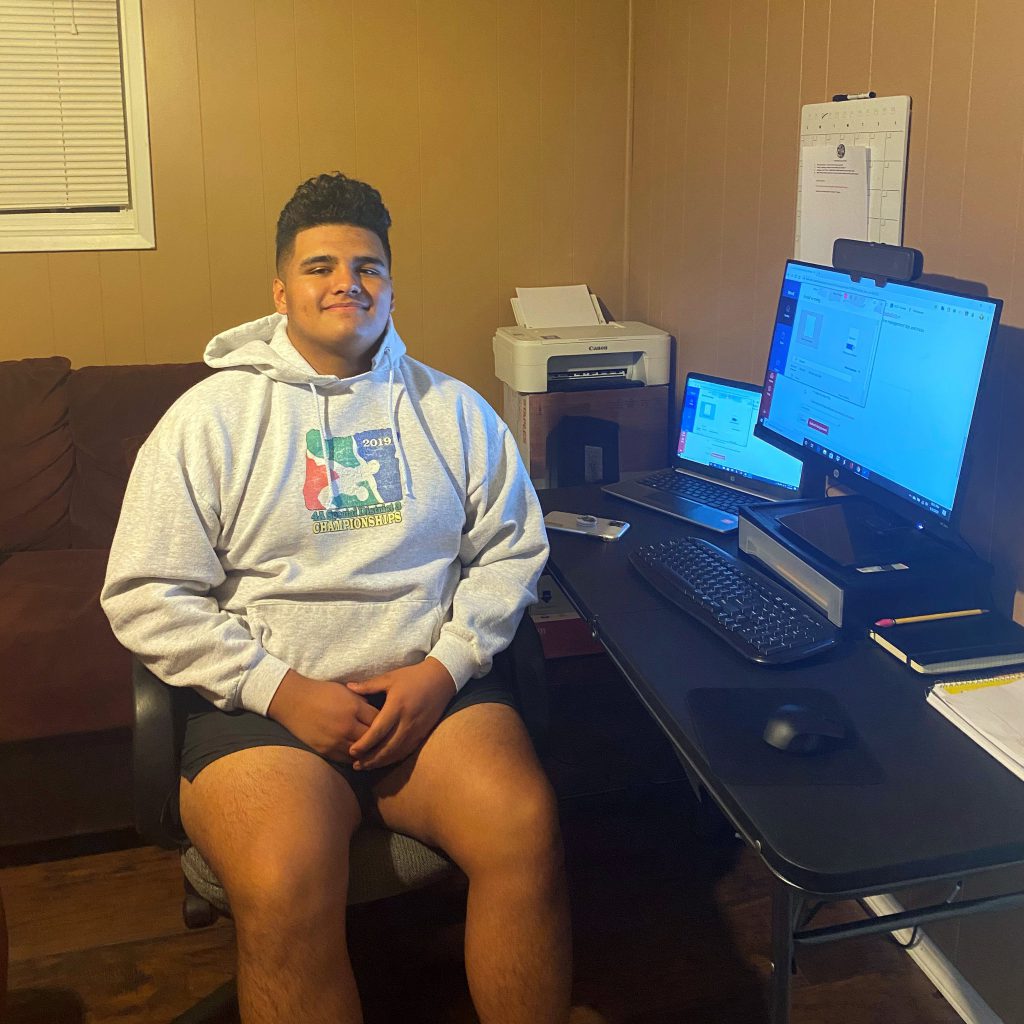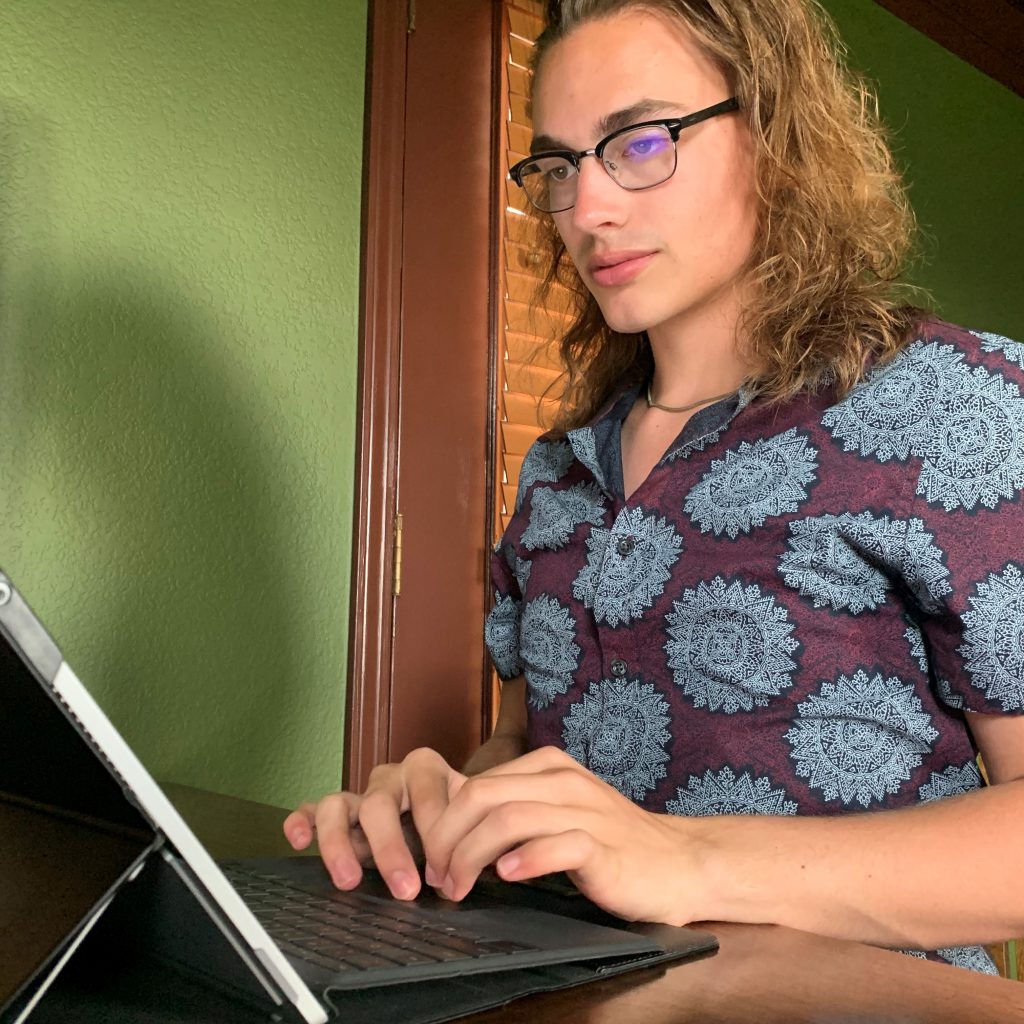Local high school students seize opportunity, enroll in courses at Klamath Community College and Oregon Tech

Isaac Pena says as a young boy one of his favorite playtime activities was to walk around the house and handcu his parents, then shu e them into a room he playfully called “jail.”
Pena, now a 16-year-old sophomore at Mazama High School, said he plans to pursue a career in law enforcement, and he is not letting the lapse in face-to-face instruction at his high school stop him from reaching his goals.
On March 12, Gov. Kate Brown issued an executive order requiring all K-12 schools to cease in-class instruction due to the global coronavirus pandemic. at order was later extended to span the rest of the school year.
At the same time, public education institutions like Klamath Community College and Oregon Institute of Technology also suspended in-person instruction and quickly adapted their courses to online formats.
Rather than let an opportunity go to waste, Pena decided to enroll in two classes at Klamath Community College: college survival and criminal justice. “I don’t want to let this coronavirus affect my learning, and I didn’t want to come back and struggle because I forgot everything,” Pena said. “I want to start my career as a police o cer and work my way up to eventually become a homicide investigator. I thought criminal justice would give me a quick head start on the basics of law enforcement.”
Learn anytime, anywhere
Taking advantage of both KCC and Oregon Tech’s online-only spring term courses, many high school students across Klamath County are capitalizing on the new exible course structure.
Kannah Greer, a senior at Klamath Union High School taking classes through Oregon Tech’s Liberal Arts Academy, said she likes the up-front nature of college courses, which typically provide students with a comprehensive list of assignment due dates and test schedules at the beginning of the term. “It’s all organized upfront. You know what is coming and when things are due,” Greer said. “Instead of doing one assignment at a time and having it due on a certain day, you can get everything done when you need to. It’s really convenient.”

Henley High School senior Hunter Cox said he likes being able to work at his own pace in the physics and biology courses he is enrolled in at Oregon Tech. “ e online courses allow me to get everything done on a Monday and then I have the rest of the week to just have fun or to study for other things,” Cox said. “I try to do everything the first time it is available because if I procrastinate it usually becomes more stressful to get done.” Greer said the ease with which students and professors can communicate using an online learning platform can be more efficient than traditional face-to-face learning, which requires people to see each other to communicate.
“Communication is a lot easier because you can literally message anybody in your class and your teacher,” she said. “De nitely learn how to communicate with your professors and always try to get your work done early. e worst thing is realizing you have an essay due at 11:59 p.m. on the day you found out about it.”
Structure at home
Janah Moorer, a 15-year-old sophomore at Mazama, says staying organized is key to being successful in online courses.
“Something I’ve noticed is that if you slack o during the day, it would be really easy to get behind. Even though you are at home, work consistently throughout the day so you don’t get slammed with a bunch of work later on,” Moorer said.
Greer, who is enrolled in a speech course at Oregon Tech, also noted time management as a key to success in online learning. She said utilizing the to-do list in Canvas, an online learning platform, has helped keep her on track and to make sure her speeches are done in plenty of time to practice her delivery.
“Even as a very committed student, I have had to learn to manage my time meticulously because it’s really easy to forget that you still have classes,” Greer said.
Pena said one of the keys to his success in taking KCC classes from home is having a dedicated workspace, complete with a desktop computer, a webcam, speakers, and a whiteboard.
“It’s like sitting in a classroom,” said Pena, who dedicates most of his evenings, 5 to 8:30 p.m., to homework and studying.
Pena said his college-level online courses have a lot of notetaking and a lot of quizzes.
“You have to put more effort into your college classes. It’s a whole different ball game than high school,” he said. Pena uses a calendar and said his strategy is to work on assignments for both classes throughout the week and to knock out the toughest assignments first.
“I have a calendar and I write down the assignments I’m going to do that day. I’d rather just get it done with so I have less to do when the due date comes up,” he said.
Getting ahead
Moorer said she would like to complete an associate degree before she graduates high school.
She plans to one day become a neurosurgeon, which she acknowledges will require completing several years of higher education.
“I saw this as a window of opportunity where I could add some extra classes and kind of get ahead,” Moorer said. “I am hoping that by using my time wisely now it will a ect me positively later on.”
Cox also wants to go into medicine. He is working toward becoming a plastic surgeon, and at the end of this academic year will have already earned roughly 60 college credits. Cox would like to one day own his own practice, possibly along with some spas and resorts, as well. He said having the opportunity to take college courses while in high school is giving him a jump start on his career.
“ is really helped me fast-track and cut some years o going to college. Instead of going to college for eight years, it will be more like ve or six. It’s more money e cient and time conscientious,” he said.
Greer plans to major in hotel administration, with a focus on sustainability, at Cornell University, which she will enroll with this summer. She said the Oregon Tech speech course she is currently enrolled in is preparing her to be a leader who can inspire others to put her ideas into action.
“With all of my business experience, I’ve realized that if you want to present projects and you want to make your ideas seem relevant and important, you have to learn how to explain them in a way that people can understand,” Greer said. “I took this speech course because I wanted to learn how to explain my ideas in a way that will make them successful and actually make them real.”
Greer advises students who are new to higher ed to make an e ort to get to know their professors.
“Build good relationships with your professors because they are there to help and teach you. If you are scared to talk to them or don’t want to ask questions, it kind of defeats the purpose of learning and being in a class,” she said.
Moorer said her advice to students considering taking online classes is to “de nitely go for it.”
“You have to make sure you are willing to put in the time before you sign up. But if you are willing to put in the time, you should de nitely go for it. It’s been really bene cial, and I think that even just adding three or four classes can really help you get ahead, if that’s what you are looking to do,” Moorer said.
For more information about Oregon Tech opportunities while in high school, contact Grace Rusth, associate director of educational partnerships and outreach, at 541-885-1034 or grace.rusth@oit.edu. For information about opportunities at KCC, contact Oscar Herrera, director of retention and student success, at 541-880-2383 or herrera@klamathcc.edu.
Klamath Community College is an Affirmative Action/Equal Opportunity/Veteran/ADA institution embracing diversity. We encourage and welcome women, minority, veteran, and disabled candidates.


Advertisement